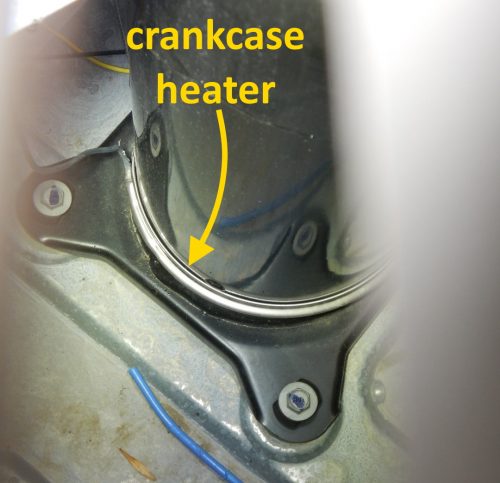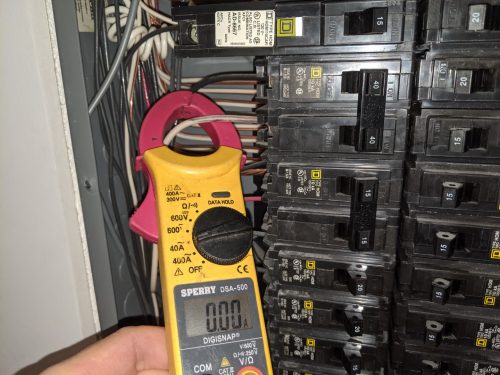Shortly after posting our fall maintenance checklist this year, I had a reader contact me to let me know that I may have missed an important fall maintenance item. His suggestion was to turn off the circuit breaker for your air conditioner during the winter months to help save electricity. If your air conditioner has a crankcase heater, that thing will run all winter long, and you’ll be paying for all of that electricity.
Crankcase Heaters, Low Temps
So what’s a crankcase heater? It’s a small resistance heater that helps to prevent damage to your air conditioner by keeping the compressor warm. More on that topic here: https://en.wikipedia.org/wiki/Crankcase_heater
From a home inspection standpoint, I don’t look for crankcase heaters and I don’t inspect them. Most air conditioners don’t have them, and if a unit does have one, I don’t trust that it’s working. When an air conditioner is operated in cold weather, generally below 60° – 65° F, there’s a potential to cause permanent damage to the unit.
Here at Structure Tech, we don’t operate units when the outdoor temperature is below 60 degrees, or when the unit is turned off at the circuit breaker.
How much money is this costing you?
If your air conditioner has a crankcase heater that runs constantly, whether the air conditioner is on or not, that will really run up your electricity bill, right?
I’d say it’s all about perspective. Assuming you have a 70-watt heater and you pay $0.11/KwH, you’ll end up paying .07 KW x $0.11/KWH, or about $0.0077 an hour. Less than a penny an hour, or about 18¢ per day. It’s not much, but it can get into the double-digits over the course of a Minnesota winter. Not enough to the point where you’d see any noticeable difference in your electricity bill on a monthly basis, however.
How to determine if your air conditioner has a crankcase heater
I don’t know of any simple way to figure this out for sure. One way would be to take a look inside of your air conditioner. You can usually peek through the top grill into the outdoor unit to get a look at the compressor. If there’s an exterior crankcase heater, you’ll see it wrapped around the compressor. The video clip below shows a compressor without a crankcase heater.
The picture below shows a peek inside of a unit that has an external crankcase heater.
If you have an internal crankcase heater, there won’t be any evidence, other than a pair of wires entering the unit, which you might not be able to see.
To know if this heater is actually sucking electricity, you could take a clamp-on electric meter to your air conditioner circuit to see if there is a load being drawn, but that goes well beyond traditional homeowner DIY maintenance.
If you have a Sense energy monitor installed at your electric panel, all you’d have to do is turn off the power to your air conditioner to see if your power usage changes.
So… power on or off for the winter?
There are pros and cons to turning off the power to your air conditioner for the winter. I’ve had HVAC technicians tell me about air conditioners that have been destroyed from running in freezing temperatures. Either someone in the family accidentally switched the thermostat to cool, or the thermostat simply malfunctioned and the unit kicked on. Turning off your circuit breaker would certainly help to prevent something like that from happening.
If you have a crankcase heater, turning off the circuit will also save on electricity usage throughout the winter.
On the other hand, I’ve spoken with several HVAC contractors who said they’ve had countless service calls to fix broken air conditioners, only to find a circuit breaker that was turned off. If you read this blog, you’re surely a diligent enough homeowner who wouldn’t make that mistake. But still. Plenty of people aren’t, so be careful advising people to turn off the power to their air conditioner. Also, if you’re relying on a crankcase heater to warm up the unit enough to not cause damage when it’s cool outside, the power should be restored to the air conditioner 72 hours before running it.
In short, I don’t feel strongly one way or the other about turning off power to the air conditioner, but it’s something to consider.



